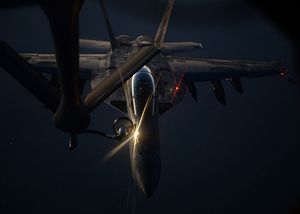In the early morning of September 23, the United States carried out 14 air strikes and launched 47 Tomahawk missiles against Islamic State (IS) targets within Syria. The U.S. has led over 100 airstrikes against IS in Iraq but Tuesday marked the first time U.S.-led forces have made good on Obama’s promise to go after IS forces within Syria’s border.
According to U.S. defense officials, the air strikes targeted weapons supplies, training compounds, barracks, and command and control facilities used by IS. The Pentagon reported that, in addition to the U.S., Bahrain, Jordan, Qatar, Saudi Arabia, and the United Arab Emirates participated in the strikes. Over the same period, the U.S. also carried out independent strikes against the Al Qaeda-affiliated Khorasan Group within Syria. In his remarks on the air strikes in Syria, President Barack Obama promised that “we will not tolerate safe havens for terrorists who threaten our people.”
As I’ve noted before, U.S. air strikes against IS pose a thorny problem for China. On one hand, Beijing has repeatedly emphasized its absolute commitment to rooting out terrorism, as well as stressing the danger international extremist groups pose for China. Beijing is particularly concerned about Uyghur militants training and fighting with IS, then eventually bringing their new capabilities to bear on China itself.
However, China is extremely wary of supporting U.S. military action on foreign soil. The airstrikes in Iraq were more palatable to Beijing, as the Iraqi government had requested help and was working in concert with Washington and its allies to coordinate the campaign against IS. Syria is another matter altogether. The U.S. government has repeatedly called for Syrian President Bashar al-Assad to step down, accusing him of using brutal tactics to protect his hold on power.
Accordingly, Syria did not request U.S. military assistance and U.S. officials have been adamant that Washington will not seek Syrian approval for military action against IS (although the Syrian Opposition Coalition has called for U.S. military action to stem IS advances). Administration officials are worried about the perception that their campaign against IS will help Assad claim victory in the ongoing Syrian civil war. To help prevent this possibility, the Obama administration plans to continue training and arming Syrian opposition groups. For their part, Syrian officials said that any U.S. military operation that does not receive prior approval from the Assad regime will be considered an act of aggression. Given these concerns, Beijing is worried about voicing too much support for a campaign that might turn into a full-on U.S. push for regime change in Syria.
Despite its previous statements, the Syrian government refrained from condemning the U.S. attacks on Tuesday. Syria’s Foreign Ministry received advance notification of the attacks, which was apparently enough to persuade the government not to view the airstrikes as an act of aggression. According to the Syrian Foreign Ministry, Syria’s envoy to the UN was informed of the strikes on Monday, hours before they began. U.S. Secretary of State John Kerry also reportedly had the Iraqi foreign Minister pass a message along to their Syrian counterpart.
China’s official state-run news agency, Xinhua, highlighted this advance notice in its coverage of the air strikes, but also repeated previous Syrian statements that the strikes could be considered an act of aggression. Xinhua also noted Russia concerns about any military strikes carried out without the “clear consent of the Syrian government or the UN Security Council’s decision.” China clearly still has reservations about the U.S. military conducting air strikes on Syrian targets.
The official response from China’s Foreign Ministry struck a similar chord. At a regular press briefing, spokesperson Hua Chunying’s first comment on the air strikes was that China hoped there were no civilian casualties. Hua then reiterated China’s support for international anti-terrorism efforts but said such actions should respect the principles of the UN charter. Otherwise, Hua warned, an already tense situation could become even more complicated.
When pressed about what contribution China will make the global fight against terror, Hua said that China would keep up communication and coordination with the countries involved. In more concrete terms, Hua said China would continue to help strengthen the anti-terror capabilities of regional countries as well as providing necessary humanitarian aid. This vision of China’s role in the fight against terrorism (and specifically IS) does not indicate any plan for China to join the U.S. in military anti-terrorism campaigns on foreign soil, despite some calls (including by The Diplomat’s Dingding Chen) for Beijing to do so. Given its deep ambivalence to U.S. military operations on foreign soil, China will likely be content to watch the campaign from the sidelines.

































